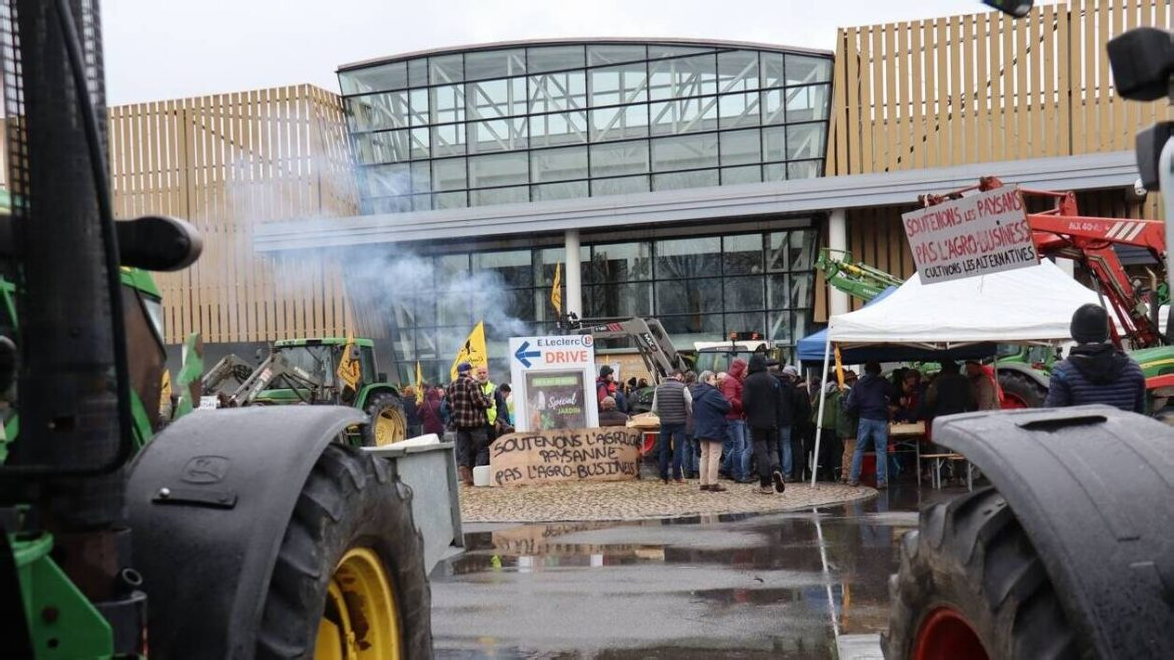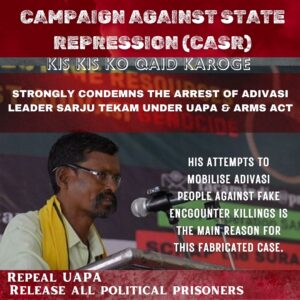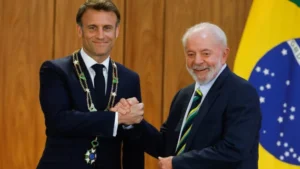
France: Interview with Romain, farmer in Loire-Atlantique
We publish an unofficial translation of the article of La Cause Du Peuple
At the end of February, the Cause du Peuple Nantes committee went to join the farmers who were blocking the SCA Ouest logistics platform, a Leclerc logistics platform which supplies the entire greater West.
We met Romain, a farmer, who told us a little about the blockage.
Romain: I am a farmer within a GAEC. A GAEC is a joint agricultural group. On our farm, we have different operations, different works. We have a herd of dairy cows, we grow our grain on the farm to make bread and flour, I take care of the market gardening workshop on this farm. It is a farm which is collectively organized, formerly a family farm, which is transforming into a farm with third parties. Most of our stuff sell through intermediaries . So we have a store on the farm, then there are AMAP [Translator’s note: Association for the preservation of farmer agriculture] networks, school restaurants, local restaurants and other producers to enhance their range in their store.
CdP: Can you tell us about this blockage?
Romain: So the blockage started Monday evening around 21h. There were 35 tractors, so a few more farmers because there were farmers who were only able to move with their car, that was really done at short notice.
The meetings took place on Monday in the afternoon and in the evening things got moving. The target, SCA West, was chosen because Leclerc does not respect the EGALIM law [Translator’s note: law that rules over the trade relations in the farmer sector] at all. They have a purchasing center in Belgium. We know that the EGALIM law is really the minimum thing, it is the minimum service, but even the minimum service is not respected. So there you go, we’re starting from a basis on which we can discuss, even with people who are not on our side. It’s logical, economical in fact.
It is a target which is quite symbolic and at the same time which makes noise. Because SCA Ouest is the largest center, the largest platform for redistributing products for Leclerc in the great West. So it will affect the Pays de la Loire as well as Brittany and even a little Deux-Sèvres, all that. So that affects around sixty Leclercs stores. If we add the drives, we are at 74 I believe.
Why did we decide to join this protest by farmers in general?
Quite apart from the labels, it’s because the demands we’ve been hearing about in the media, whether from the FNSEA [Translator’s Note: National Federation of Agricultural Holders’ Unions], the Coordination Rurale [Translator’s note: French farmers’ union], are absolutely not the ones we’re making. We have points of convergence on free trade agreements, and for example, there’s a European law about to be passed on the turning of the soil. We won’t be able to till it, for example, grasslands that are considered permanent, but they are considered permanent after five years.
We, in organic farming, have long rotation systems. This is the basis of organic farming, rotation and therefore in a system where we do different works, if we cannot return old meadows after a while, thus integrating them into the rotation cycle, we will find it blocked and therefore limited and confined to either only breeding, or only cultivation. Finally, this is really a specialization that annoys us.
So there’s this point, this point on which we could agree with, let’s say, the Coordination Rurale. On the other hand, these unions want to continue to be able to pull up hedges, they want to be able to spread pesticides around schools and homes, they want to get rid of all the laws on the coast, so on discharges, whether it’s livestock effluents or nitrogenous fertilizers, this kind of thing that will end up in waterways, creating green tides, we know what that does, it causes deaths on the coast and all that.
We are convinced that agriculture is what manages the French territory and territories in general. If agriculture does anything, we will have no capacity to withstand as a society the shocks that will await us with global warming. So that’s why we are here, to say that there is another agriculture that exists, that is possible, and that we are not obliged to treat, we are not obliged to tear up the hedges to feed the world. We chose this symbolic place to make another voice of agriculture heard.
CdP: What do you think of the discussions at Matignon at the moment? What would you like to obtain from this movement, beyond the FNSEA agreements?
Romain: The FNSEA, I blame them, but I don’t blame the people who are members of the FNSEA because the problem with most agricultural structures in France today is that we are over-indebted.
You have to go into debt to buy your tractor, your farm to be able to work. You are in debt to be able to work, not to buy a yacht. So these people (farmers, editor’s note), they are required and they are obliged to always do bigger because we put them more and more in competition with countries which do not have standards or which do not have the same taxes because we have a united social system. For now still, pretty much *laugh*. And so inevitably, as we are put in competition, we always have to produce for less. And so, if you break the standards, you will do it for less and everything. But we are heading towards impoverishment, general impoverishment if we think like that because we will always find cheaper elsewhere, we will inevitably find labor for less, because to bring down prices we must either take the quality of the product, is on the workers or even both, we are going to return to a system of slavery by continuing like this.
CdP: What are your objectives, your perspectives?
Romain: We hope to make the general public understand that it is not that we are farmers so we want to destroy the land and that we want to harm biodiversity. That is one of the main issues, to take advantage of the fact that there is an interest for everyone, for the average citizen, for agriculture.
Also, we know that in three days, if this platform is blocked, the Leclercs will be more supplied. So it’s also putting major distribution at risk a little because we, in our system, believe that mass distribution is doing as much harm than agricultural industry.
They are the ones who force farmers to go into debt, to compete with countries that do not have the same standards as us. But we are proud of these standards. There are standards that are poorly established, but that’s the problem with bureaucracies, it’s systematic. But in any case, we are proud to also be able to say that there have been some small ecological advances and we do not want to go back on that. We don’t want to come back to this, that’s essential.
CdP: thank you Romain for your testimony, see you soon!

